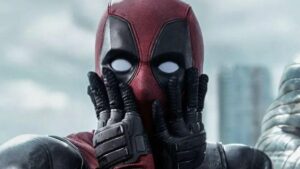
20th
Century
Fox
There
have
been
very
few
times
I’ve
encountered
something
in
life
that
feels
like
it
was
absolutely
made
specifically
for
me.
The Deadpool movie
series
is
one
of
those
few
things.
For
my
sensibilities,
they’re
just
about
perfect.
And
one
of
my
favorite
aspects
of
the
films
is
the
fourth-wall-breaking
nature
of
the
main
character.
Deadpool
will
often
look
into
the
camera
and
talk
to
the
audience
in
a
way
that
acknowledges
that
he’s
in
a
movie.
Examples
of
this
are
legion:
Deadpool
referring
to
the
X-Men
house
smelling
like
Patrick
Stewart,
complaints
in
movie
about
licensing
restrictions
preventing
cool
cameos
by
other
Marvel
characters,
or
the
narration
in
the
2nd
film’s
opener
about
how
the
entire
movie
was
in
a
fact
a
“family
movie.”
The
point
here
is
that
cultural
references
that
would
normally
have
no
place
in
a
superhero
movie
abound.
Some
of
those
references
even
revolve
around
lead
actor
Ryan
Reynold’s
personal
life.
For
instance,
in Deadpool
&
Wolverine,
a
multiverse
version
of
Deadpool
that
is
female,
Ladypool,
was
played
by
Reynolds’
wife,
Blake
Lively. Lively
recently
sued a
director
and
co-star
of
a
film
she
was
in,
Justin
Baldoni,
and
while
Baldoni
had
threatened
to
sue
her
back,
instead
he… sued
the
NY
Times for reporting
on
Lively’s
accusations.
Lively
sued
over
accusations
of
some
very
gross
workplace
behavior,
among
other
things,
whereas
Baldoni
is
arguing,
um,
that
the
NY
Times
reporting
on
Lively’s
accusations
is
defamation
and…
fraud?
Those
accusations
included,
for
instance,
Baldoni
attempting
to
pressure
Lively
over
her
physique
in
the
movie
shortly
after
she
had
a
child,
sharing
inappropriate
content
with
castmembers,
and
talking
openly
about
sexual
topics.
Baldoni,
meanwhile,
has
been
quite
famous
for
portraying
himself
as
a
really
nice
guy
and
talking
openly
about
how
he’s
a
“feminist.”
What
does
any
of
this
have
to
do
with Deadpool?
Well,
another
multiverse
character
that
shows
up
is
Nicepool,
an
unmasked,
long-haired
version
of
the
titular
character.
And
fans
noticed
some
similarities
to
the
details
surrounding the
accusations
Lively
has
made
against
Baldoni.
The
particular
moments
in Deadpool
&
Wolverine that
echo
Lively’s
claims
against
Baldoni
include
Nicepool’s
lines
about
Ladypool
“snapping
back”
into
shape
after
having
a
baby
and
following
that
up
with
“It’s
okay,
I
identify
as
a
feminist”—since
Baldoni
touts
his
status
as
a
feminist
in
his
podcast.
A
deleted
scene
in Deadpool
&
Wolverine also
saw
Nicepool
making
reference
to
a
feminist
podcast;
that
latter
scene
in
particular
helped
the
“Baldoni
is
Nicepool?”
theory
go
viral.
And
viral
it
went,
indeed.
Major
entertainment
media
sources
even
picked
this
up
and
ran
with
it.
I
will
make
no
claims
as
to
the
veracity
of
Lively’s
claims
for
the
purposes
of
this
post.
I
will
say
that
every
action
Baldoni
has
taken
since
appears
to
be
designed
to
keep
those
claims
in
the
headlines
for
as
long
and
as
loud
as
possible.
And
the
fact
that,
despite
suggesting
he
would
sue
Lively
directly,
he
hasn’t…
seems
telling.
Also,
suing
the
New
York
Times
for
reporting
on
all
of
this?
That
is
a
very
silly
gambit
unlikely
to
end
in
any
kind
of
victory
for
Baldoni
and
most
certainly
Streisanding
the
attention
on
the
accusations
against
him
through
the
proverbial
roof.
But
Baldoni
wasn’t
done
there.
Once
the
speculation
about
Nicepool
started,
he
fired
off
a
litigation
hold
to
Disney
and
Marvel,
once
again
propelling
all
of
this
back
into
the
news.
According
to Variety,
Baldoni’s
lawyers
are
using
the
accusation
as
grounds
for
issuing
a
litigation
hold
letter
which
calls
on
Disney
and
Marvel
Studios
to
retain
“documents
and
data”
in
regards
to
Baldoni
and
“Nicepool.”
The
litigation
letter
presented
by
Baldoni’s
team
asks
Marvel
and
Disney
to
preserve
“any
and
all
documents
relating
to
the
development
of
the
‘Nicepool’
character”
in
addition
to
“communications
relating
to
the
development,
writing,
and
filming
of
storylines
and
scenes
featuring
‘Nicepool’”
and
“all
documents
relating
to
or
reflecting
a
deliberate
attempt
to
mock,
harass,
ridicule,
intimidate,
or
bully
Baldoni
through
the
character
of
‘Nicepool.’”
It’s
hard
to
see
the
strategy
here.
I
suppose
that
perhaps
there
might
be
some
utility
in
building
towards
a
defamation
and/or
harassment
case
using
whatever
can
be
dug
up
from
Disney
and
Marvel.
But,
frankly,
I
doubt
it
will
be
much.
And
the
content
that
appears
in
the
movie
is
very
much
going
to
be
protected
speech
on
First
Amendment
grounds,
given
its
parody
nature
and
the
extremely
veiled
references
it
makes
(if
it’s
even
making
those
references
at
all).
Using
myself
as
a
convenient
test
case,
I
had
zero
idea
who
Baldoni
was
until
I
caught
wind
of
this
whole
mess
with
Lively,
his
suit
against
the
New
York
Times,
and
most
recently
this
legal
notice
sent
to
Disney
and
Marvel.
Now
I
don’t
know
that
I
could
forget
his
name,
his
image,
nor
the
accusations
leveled
against
him
even
if
I
tried.
So
if
the
impetus
for
all
this
action
by
Baldoni
was
over
anger
at
the
public
nature
of
these
accusations,
well,
it
seems
he
is
working
against
that
purpose
at
the
moment.
More
Law-Related
Stories
From
Techdirt:
FTC
Finally
Sues
John
Deere
Over
Years
Of
‘Right
To
Repair’
Abuses
Ninth
Circuit
Reverses
Course,
Says
Oregon’s
Surreptitious
Recording
Law
Is
Constitutional,
Actually
Colorado
Dept.
Of
Corrections
Spends
$500k
On
Body
Cams
Before
Deciding
No
Officers
Need
To
Wear
Them

